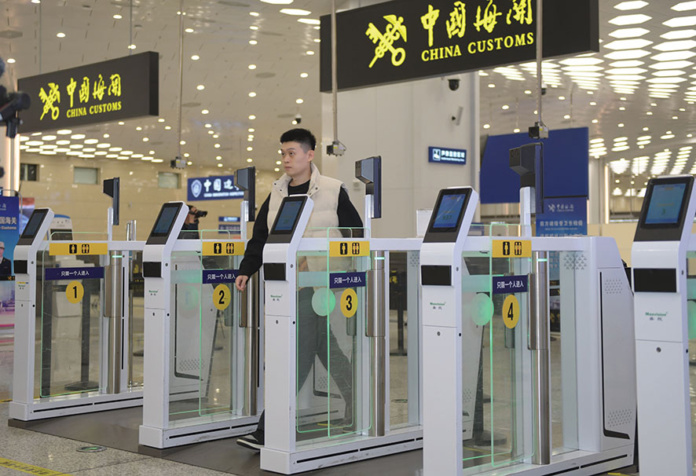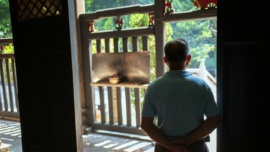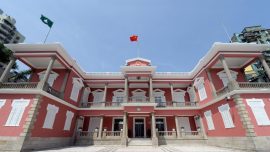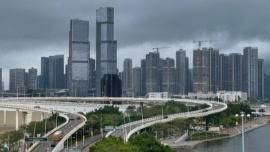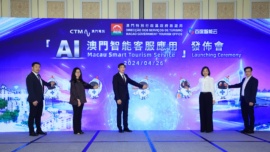The new two-tier customs arrangements for goods implemented in Hengqin since March represent a significant step towards facilitating greater opportunities for Macau residents to live, work, and run businesses in the nearby cooperation zone. Local community representatives call for better awareness of the new policies.
Macau Business magazine – March 2024 edition
In fewer than three years following the establishment of the Guangdong-Macau In-depth Cooperation Zone in Hengqin, an important vision behind the development of this zone, co-governed by both the Guangdong and Macau authorities, has finally materialised—the implementation of the so-called “closed customs operations.” These novel two-tier customs arrangements, which specifically target the flow of goods between Macau and Hengqin, are expected to expedite further integration between the two places and advance the city’s economic diversification, as hoped by the authorities and observers.
Starting on March 1, these new “closed customs” measures have come into force. The customs arrangements between Macau and Hengqin are now regarded as the “first tier,” where any individuals—including Macau residents, Mainland Chinese, and others—still have to present their respective travel documents to cross the border as usual.
However, the inspection and customs clearance for goods have been relaxed. Eligible Macau residents are now allowed to carry up to 5 kilograms of daily necessities from Macau to Hengqin every day, including cooked meat, milk and dairy products, eggs, fresh vegetables and fungi, and others. They are also permitted to bring a pet—either a cat or a dog—across the border per visit, provided they comply with certain requirements. There will also be minimal customs inspections on goods transported from Macau to Hengqin, as long as the goods are for self-use and not for commercial purposes.
5,952
– No. of Macau-backed enterprises in Hengqin as of end-2023
Autonomous customs territory
At the expense of easing customs clearance and inspections on the “first tier,” new arrangements have been applied to the so-called “second tier,” which refers to the boundaries between Hengqin and other parts of Mainland China. In the past, there were no customs checkpoints on the “second tier,” but now several customs stations have been established for the inspection and clearance of goods. For example, individuals traveling on public transportation, such as buses departing from Hengqin to other parts of the mainland, must undergo inspection when arriving at the customs checkpoints on the “second tier,” but they do not need to present their travel documents again. Travellers, excluding non-residents, can carry duty-free personal belongings and goods worth no more than RMB 8,000 when entering other parts of the mainland from Hengqin.
The Macau authorities have stated that these new customs arrangements are crucial for expediting a more convenient flow of people, goods, capital, information, and other aspects between Macau and the cooperation zone, thus accelerating the development of the cooperation zone.
These new measures position Hengqin as an autonomous customs territory separate from other parts of the mainland. Similar customs arrangements have also been planned for Hainan, the southernmost province in China, which is expected to become a duty-free area for the country. However, the enforcement of these new customs arrangements for Hainan is projected to begin no earlier than 2025.
“It is a key policy for the integration of Hengqin and Macau… These will result in a more vibrant landscape and a more diverse range of businesses [in the two places].”
– Macau legislator Si Ka Lon
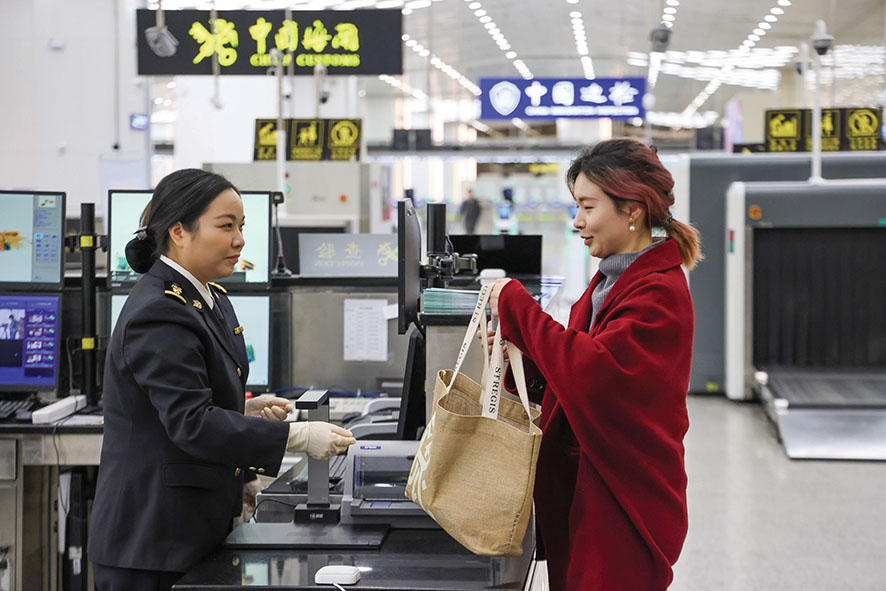
Similar to Macau
Macau legislator Si Ka Lon hails these long-awaited customs arrangements for Hengqin. “It is a key policy for the integration of Hengqin and Macau, providing more convenience for the flow of people and goods between the two places,” he remarks. “These will result in a more vibrant landscape and a more diverse range of businesses [in the two places].”
Together with other advancements in the cooperation zone, such as the recent completion of the Macau New Neighbourhood housing project in Hengqin, Mr. Si, who is also a Macau deputy to the National People’s Congress (NPC), believes that these novel customs arrangements will gradually transform the living environment of the zone “similar to those of Macau.” The Macau New Neighbourhood refers to a 4,000-flat housing complex developed in the cooperation zone exclusively reserved for Macau residents.
“It has significantly expanded the business and living environments of [Macau] residents and facilitated the moderate diversification and high-quality development of Macau’s economy,” the NPC Macau deputy remarks. Expecting that it may take some time for the smooth implementation of these new customs procedures as some of the customs facilities at the “first-tier” and “second-tier” are yet to be operational, he adds that the authorities should complete those facilities as soon as possible to enhance the efficiency of customs inspection and clearance.
According to the authorities’ plan, there are seven “second-tier” customs checkpoints between Hengqin and other parts of the mainland, including four land checkpoints: Hengqin Bridge, Hengqin Tunnel, Shenjing Passage, and Shizimen Tunnel. Temporary customs facilities have been readied at the Shizimen Tunnel, while the permanent customs facilities will only be operational later this year.
“It is important for the authorities to continue to heed the public’s calls and make prompt adjustments to the measures if needed.”
– Macau NPC deputy Ng Siu Lai

Make necessary changes
Another Macau NPC deputy, Ng Siu Lai, points out that these new measures are particularly beneficial to Macau residents who work or live in the cooperation zone. “These have long been anticipated… to align the living conditions in Hengqin with those in Macau step by step,” Ms. Ng says. She is also the president of the General Union of Neighbourhood Associations of Macau, one of the largest grassroots groups in the city. Latest figures from the cooperation zone show that over 75,370 individuals—including both Macau and non-Macau residents—worked in Hengqin as of the end of 2023, surging by 13.6 percent year-on-year.
Nonetheless, she emphasises that the authorities should further enhance the promotion of these new customs arrangements among the Macau public, as they “are yet to fully comprehend all the measures in detail.” The government can host more seminars and sharing sessions with local associations on the matter, as well as disseminate the relevant information in various formats online, such as engaging videos, she adds.
The authorities from both sides should also prepare contingency plans for the heavy traffic among Hengqin, Macau, and other parts of the mainland, especially during peak hours in the initial stage of implementing this new customs regime. “It is important for the authorities to continue to heed the public’s calls and make prompt adjustments to the measures if needed,” she remarks.
“[The new customs regime] will create better conditions for Macau residents to run businesses, work, and live in the cooperation zone.”
– Frederico Ma, president of the Macau Chamber of Commerce
Business environment
These measures are expected to bring both convenience and benefits to Macau residents living and working in Hengqin, as well as advantages for businesses operating in the cooperation zone. With the new customs arrangements, the declaration and inspection procedures for goods between Macau and Hengqin have been simplified, while most trade can also be duty-free.
Furthermore, goods manufactured in the cooperation zone that comprise imported components accounting for 30 percent or more of their value can be exported to other parts of the mainland via the “second tier” without import duties. Macau’s manufacturing businesses in fields such as integrated circuits, electronic components, new materials, new energy, biopharmaceuticals, traditional Chinese medicine, and rough diamond processing can fully leverage these new customs arrangements and policies to extend their production and processing activities to the cooperation zone, thereby reducing the costs for products to be exported to other parts of the mainland, the authorities have said.
Since the establishment of the cooperation zone in Hengqin in September 2021, the technology research and development, high-end manufacturing (including traditional Chinese medicine), modern finance, as well as cultural tourism, exhibition, and trade sectors have been designated as the four emerging industries in the zone, supporting Macau’s diversification efforts.
According to figures from the cooperation zone, there were 5,952 Macau-backed enterprises in Hengqin as of the end of 2023, representing an 11.8 percent year-on-year increase. It is projected that this number will reach 8,000 by the end of this year and approximately 25,000 by 2029, according to authorities’ forecasts. In addition, the zone’s gross domestic product (GDP) experienced a modest 2.3 percent growth last year, with the modern finance, property, and rental sectors being the largest industries in the zone.
The Hengqin Institute of Innovation and Development, a think tank in the cooperation zone, also highlighted in a statement that, for example, enterprises, administrative agencies, and associations registered in the zone can be exempt from all types of import duties for the importation of machinery, equipment, and other items for self-use. “These will further reduce production and operating costs for businesses in the zone… [and] attract a wide range of creativity and innovations in the zone, ultimately aiding Macau in achieving its economic diversification,” the institute adds.
The Macau business community eagerly awaits the details of how these new customs procedures and measures will be implemented and yield substantial benefits for business operations in the coming months. Frederico Ma Chi Ngai, president of the Macau Chamber of Commerce, stated in a press statement, “Overall, this new customs regime will facilitate more exchanges between Macau and the cooperation zone.”
“This will create better conditions for Macau residents to run businesses, work, and live in the cooperation zone,” he adds.





